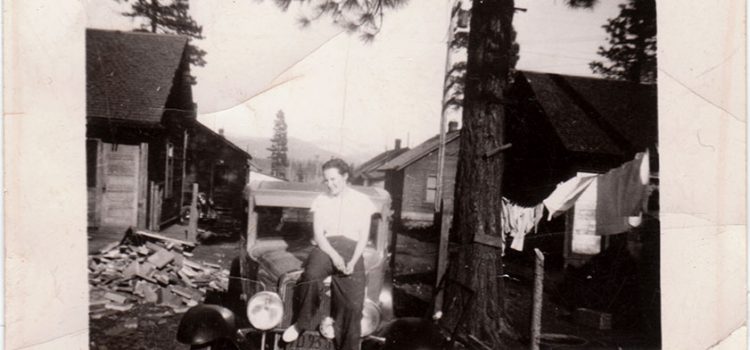
How does hearing pioneer stories affect you?
One hot, sticky summer evening my husband was talking to a room full of teenagers about how to remember their ancestors. While the girls fanned their faces and ate ice cream, he told them a story about a young African man that walked several miles a day so he could work and earn money to visit a religious temple. As far as worldly riches, the young man had nothing and it took him a few years to earn the money, but he did it. He made a real and significant sacrifice for his faith. “In each of your families you have someone like that. Someone that sacrificed for their faith. Find out who they are and what they did. You will be stronger for it,” he told the kids.
I sat up a little straighter in my chair too. What had my pioneer ancestors done for their faith? Do I make similar sacrifices in my life? What makes you a pioneer anyway? Do I make them proud with what I do, in the same way I am proud of them?

Sheri Dew shared how her ancestor’s stories encourage her
His comments piggy-backed on some of Sheri Dew’s thoughts she shared with us at RootsTech in February, 2017. I loved what she had to say about how pioneer stories give her some encouragement to be better. Her ancestors lived through the dust bowl in Kansas over 100 years ago.
“When I start whining about my life and think, ‘my life is so hard,’ well you’re not livin’ through the dust bowl. You’re not pulling a handcart through Rocky Ridge,” she said. “I think that’s the power in those stories,” she noted. I agree whole-heartedly. There have been many days of my life when I have thought of my own grandmothers and the challenges they faced – they were both working mothers in a time when women didn’t work much. But they did it and they did it with finesse. It helps me every day. Thanks, Sheri, for that beautiful reminder. Watch the Sheri Dew video here: https://youtu.be/lDEnKPPl1E0
What are my pioneer stories?
Some of my pioneer ancestors immigrated from Holland. Two of my great aunts came to the United States and worked hard, long hours in Utah to make money for the rest of my family to come to Utah. They came in pairs until the whole family got here. There was death, struggle and sacrifice along the way. It was hard and I am proud of them. I love them dearly even though I only met my Great-Grandma Kap.
Baptisms in Holland were done by cutting a hole in the ice. When the last part of the family got off their ship on Ellis Island strangers generously gave them some bananas. My great-great grandmother threw them away because she had never seen a banana before. I love this story because it exemplifies the great changes they were willing to sacrifice for their faith. They had much to learn about their new home and my great-great grandma was willing to learn, but also wanted to protect her family.
Gratitude through hardships
Two great-great-great grandmothers walked every step of the way from Iowa to the Salt Lake Valley with the wagon companies. One even nursed a baby as she walked. They both lost children, parented alone while husbands were called on missions, and suffered many other hardships, yet they had much joy and rejoicing in their life.
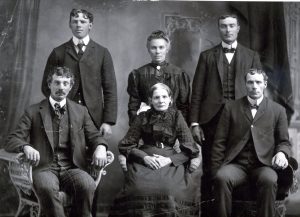
One thing that always strikes me in reading their stories is their gratitude. My great aunts, who I mentioned before, never felt put upon for coming to the United States to earn the way for their family, only gratitude. One of their daughters writes: “I am also impressed with the gratitude they expressed for their blessings and the joy they felt in seeing their children grow up without suffering the hunger pangs and poverty that seemed their common lot in their native land.” I agree with her. Their gratitude and thankfulness is something I am going to try harder to apply in my own life.
Lessons from all types of pioneers
Lessons were learned by them. Am I learning my lessons? I hope so. Bless those pioneers and their stories. Remembering them strengthens me. I have no doubt I am a better woman today because of them and I also know they are cheering me from the other side. How do your pioneer stories strengthen you? I would encourage you to take a moment and record your thoughts, and even throw in a family pioneer story with it!
Sometimes we get caught up in thinking our ancestors had to pull a handcart or ride in a wagon to be a pioneer. But that’s not the case. My grandparents moved to Westwood, California early in their marriage and paved the way for many generations to be active in their faith through their choices. I will be forever grateful for their desire to go the church and pave the way for me. They worked hard to build a great life.
Unexpected pioneer connections
In 2020 I was able to make a connection with an ancestor through a story I shared and we both enjoyed a discovery together. I had the chance to speak at RootsTech in a session that was live-streamed. In the session, I talked about my ancestors that had immigrated from Holland and how it affected my grandfather. I had a second or third cousin (who I have never met before) who was listening to our session as she took her morning walk. She knew we were related in some way because she had seen my husband’s name on our tree on Familysearch.
As she listened to me talk about my Dutch ancestors her heart was pricked as she thought about their immigration. “They were true pioneers and I never thought of it that way,” she told me in an email. She went on to say how grateful she was for that experience to give her new perspective. It gave me some as well. We are all pioneers in our own way, especially at this time in history. The world is ever-changing and when we stand for what we believe in and share it, we are pioneers too.
Related article: Finding forgotten voice in the church history library
Write their stories
Oftentimes stories of our ancestors are passed down from generation to generation through oral storytelling only or they are put together in different ways on family history sites like FamilySearch or Ancestry. You may want to take a stab at making them your own or sharing some of those stories in your own history. Figuring out where to start can be daunting. But the biggest suggestion I can make to you is to start.
Is there a story you have heard over and over again? Write it down and add your own perspective. For instance, take the banana story from above. It’s written down in a history on FamilySearch, but when my grandpa shared the story it had more details and embellishment. I wrote the story according to him and added my own perspective, what I learned from my great-great grandma about her personality. Sometimes sharing a story with our own perspective thrown in means more to the reader later on.
Another writing tip would be to weave a pioneer story into a story of your own life. Compare how it relates to something that is happening to you now. There are always connections to our past if we’re willing to take the time to look for them.
Related Article: Family Search CEO – Everyone can do family history with a story
Using new technology for old stories
Another idea is to re-write the story including more history and research. There is so much access to technology now, with a few clicks of a mouse you may be able to find some extra history to add new dimension to an ancestor’s story.
It is also wise if you are writing a story or vignette, to tell the story as it’s happening rather than saying – “I would like to think” or “from my research.” Instead, tell the story as it’s happening and then include a footnote to annotate your research or add a preface to your story explaining your research.
You can also use pictures to tell a story. We can glean so much information from a simple photo. We understand how our ancestors dressed, where they lived, and maybe things that were important to them from a single photograph. It can be fun to do this activity with a child and make up your own stories to match the pictures. These can be great pioneer day activities as well!
How can you get the most from Pioneer Day with your family?
We have a few ideas of how to really bring the pioneer spirit into your home this week.
- Read some family pioneer stories or enjoy a book about them. There are a some Gerald Lund classics we love: The Work and the Glory series (traces a fictional family all the way across the plains), Undaunted series (details the story of the hole in the rock pioneers). Also, checkout pioneer stories that have been saved online. The LDS’s church’s database contains stories about nearly all the wagon and handcart trains. I was delighted to read accounts of many of my own ancestors there after finding their names on FamilySearch’s own database with my pioneer relatives. If you have an account, this is accessible to you as well. (See below for that tip.)
- Check out FamilySearch. If you don’t have an account, this is a great time to make one and if you do and then do a little searching you just may find a treasure trove of pioneer stories that someone has included in your tree. I just found a golden stash today and spent some quality time shedding a few tears as I read some of my pioneer stories.
- Watch a great pioneer movie. 17 Miracles or Ephraim’s Rescue are two that come to mind. Your children will be enthralled and it could open the floodgates with questions about your own pioneer heritage.
- Visit a Family Discovery Center or a pioneer museum. The Daughters of the Utah Pioneers has locations in Ogden and Salt Lake City and they have officially opened back up! They have amazing collections of artifacts and docents that have limitless knowledge and great stories to tell. We try to take to our kids every year.
- And if you do nothing else, just take a moment, as a family or personally, to reflect on the sweet sacrifice of the forefathers of your family.

Rachel J. Trotter is a senior writer/editor at Evalogue.Life – Tell Your Story. She tells people’s stories and shares hers to encourage others and especially loves family storytelling. A graduate of Weber State University, Rachel has had articles featured on LDSLiving.com and Mormon.org. She and her husband, Mat, have six children and live on the East Bench in Ogden, Utah.
Subscribe!

Get our weekly email with tips to tell your story and the Sunday Edition. (Free, of course)

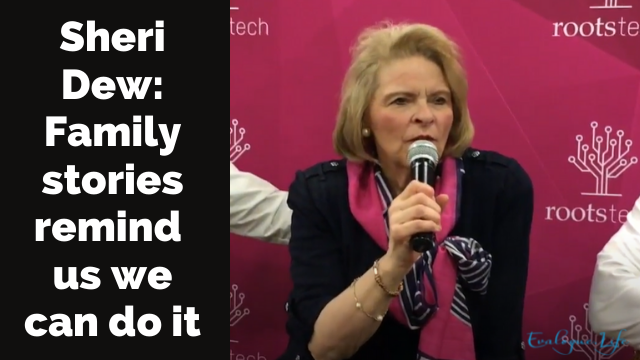
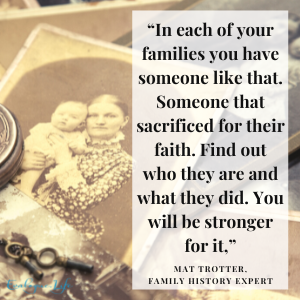
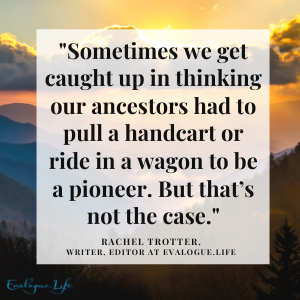



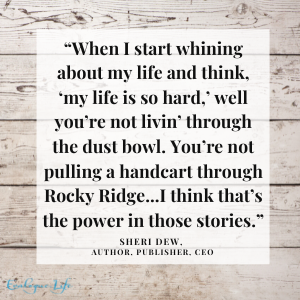
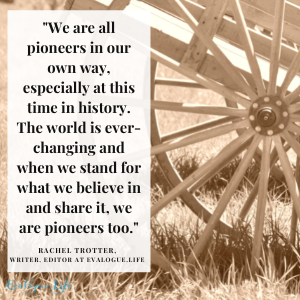

Pingback: This week's crème de la crème - July 23, 2022 - Genealogy à la carteGenealogy à la carte
Pingback: Grandpa's Voice Tells their Pioneer Story - Tell Your Story with Evalogue.Life
Pingback: Seven Ways to Share Family Stories and Make Memories at Dinnertime | Meridian Magazine
Pingback: Dinner is the prime place for perfect conversation starters for family
Pingback: Finding forgotten voices in the Church History Library - Tell Your Story with Evalogue.Life